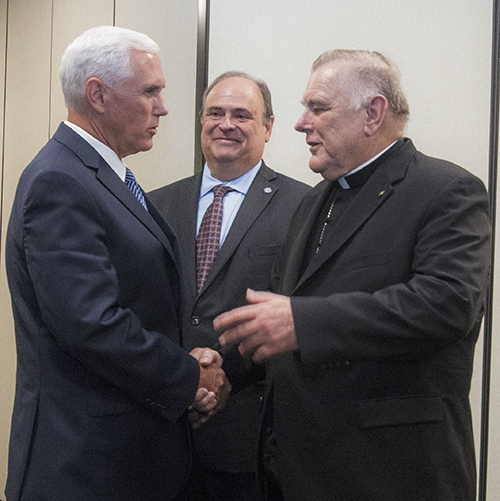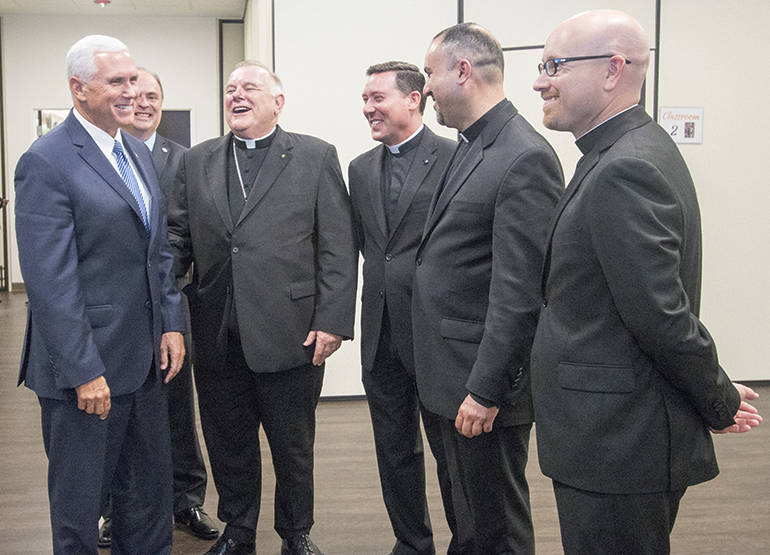By Ana Rodriguez Soto - The Archdiocese of Miami

Photographer: ANA RODRIGUEZ-SOTO | FC
Archbishop Thomas Wenski greets Vice President Mike Pence as Juan Carlos Bermudez, mayor of Doral, looks on.
DORAL | The news made some parishioners cringe: Our Lady of Guadalupe, a church populated by immigrants and exiles, would be hosting Vice President Mike Pence, the second-in-command of an administration that has embarked on an anti-immigrant campaign of deportations, refugee bans and wall-building.
The optics were horrid too. Before the image of Our Lady of Guadalupe would stand the representative of a U.S. president who had begun his electoral campaign by calling all � save “some” � undocumented Mexican immigrants “rapists” and “criminals.”
As longtime parishioner Antonio Fernandez posted on Facebook, and in a letter to Archbishop Thomas Wenski and his pastor: “I wonder if Mr. Pence is aware that at least two-thirds of the cost of the construction of our parish buildings has been covered by a generous Mexican family, domiciled south of the border.”
He noted that the parish has no construction debt, “all thanks to Mexicans that proudly supported the building [of] a temple in Doral to honor their mother, Our Lady of Guadalupe.”
Worse, he feared the church was being used for “political propaganda � like so many others (politicians) used la Esquina de Tejas or Versailles for their rants with the Cubans in the past.”
Granted, the political tone of the event was inescapable. All the politicians who spoke in the church � Pence, Rep. Mario Diaz-Balart, Sen. Marco Rubio, Gov. Rick Scott � are Republicans. And judging from the cheering at the invitation-only event, so were those in attendance.
In interviews with the Florida Catholic, Fernandez’s objections were noted by Our Lady of Guadalupe’s pastor, Father Israel Mago, and another longtime parishioner, Dina Mitjans. But they, along with Archbishop Wenski, chose to look at the Aug. 23 listening session with Venezuelan exiles, and subsequent vice-presidential speech in the church, through a different lens.
“Just the fact that he’s standing with her, with the cross in back of him, is already a sign that she is in control,” said Mitjans, referring to the larger than life crucifix and image of Our Lady of Guadalupe that anchor the church’s sanctuary.
“I’m hoping � praying � that this will not divide our parishioners,” she said, calling the event “an act of mercy, because the Venezuelan people need to be heard. The ones here live in fear of what is happening with their families in Venezuela. The fact that the vice president is coming here means he wants to hear first-hand what is happening there.”
Although it is named for Mexicans’ beloved patroness, Our Lady of Guadalupe embodies her other title, patroness of the Americas. About 60 percent of the parishioners are Venezuelans, reflecting the makeup of the city of Doral, and they consider the parish their “spiritual home.”
But the congregation also includes Cubans, Colombians, Argentines, Brazilians and “then the rest,” said Mitjans. “It’s a very diverse community.”
Still, the number of Venezuelans has been increasing as conditions in their country deteriorate. The trickle that began when Hugo Chavez was elected has turned into a flood as his successor, Nicolas Maduro, presides over a crumbling economy and a no longer disguised dictatorship.
“In every Mass, we have at least 20 to 25 people that stand up every Sunday and say they just came in � new arrivals,” said Mitjans.
That’s why Father Mago’s response to the critics � who he says are not in the majority � is to urge them to look at the visit through the eyes of faith, not politics.
“For me, it gives me hope,” he said. “It’s a symbol of unity and I think it’s a blessing to be able to be a bridge between the government of the U.S. and the Venezuelan community.”
As he prayed at the start of the vice president’s meeting with representatives of the Venezuelan diaspora: “Tell us what to say and how to say it for the greater glory of God. Help us see the fruits of this encounter for the sake of Venezuela.”

Photographer: ANA RODRIGUEZ-SOTO | FC
Vice President Mike Pence shares a laugh with, from left, Archbishop Thomas Wenski, Father Richard Vigoa, Father Israel Mago and Father Luis Pavon, pastor and parochial vicar, respectively, at Our Lady of Guadalupe Church in Doral.

